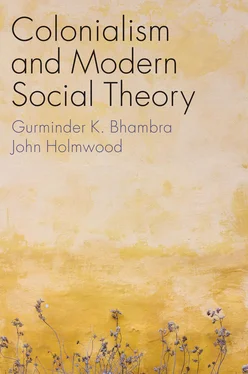We do not claim that the idea of a canon is problematic in itself. As Frank Kermode (1985) argued, a canon represents a shorthand, a way of focusing attention on a specific aspect of a tradition. For Randall Collins (1997), it is a simple truism that a conversation carried out in the past had at the time many more interlocutors than come to be recognised retrospectively, in accounts of that past that focus on selected contributions – which thereby become canonical. He argues that this should not be the reason for a ‘guilt trip’. However, emphasising this rather misses Connell’s point, which is about how a conversation of the past is edited and which topics are carried forward. For our purposes, what Connell very nicely sets out is a disjunction that arises in representations of the history of sociology when the latter comes to be understood as being about the self-understanding of modernity rather than about an external understanding of modernity’s ‘others’. While empire is the unselfconscious context for the former, it is elided in the latter. The idea that sociology’s distinctive and specific topic is modern society emerges primarily in the post-Second World War period and is associated with the expansion of mass higher education. This produces a new audience for sociological writing, an audience of students rather than simply a wider public audience. A sociology that was fragmented around studies of global differences made available to western eyes by empire was in need of integration and a new jurisdiction. As Jeffrey Alexander (1987) has argued, the ‘classics’ – a canon of founding figures – became a means of integrating the discipline.
The expansion of mass higher education also coincided with ongoing anticolonial movements against imperial regimes across the world. European empires were largely dismantled in the postwar period. A new jurisdiction for sociology became associated with the idea of modernity and the development of national societies. This separated ‘nations’ from their erstwhile colonial and imperial engagements and turned the focus of sociology inwards. The problems of sociological concern were increasingly understood to be social divisions and exclusions internal to national societies and familiar to the new generations of students, who often were the first members of their family to attend university. In this context, issues of class and gender came to the fore, as would issues of sexuality a little later.
Most sociological accounts of European modernity begin with Nisbet’s two revolutions as key formative events. However, it was not until the implications of these events became clearer that the main contours of modernity could properly be outlined – or at least so the story initiated by the new jurisdiction, or field for the application of sociology, went.
Robert Nisbet’s (1966) acclaimed book The Sociological Tradition drew a distinction between the characteristics of traditional society and those of modern society according to which the French Revolution and the Industrial Revolution were decisive in creating a break with the past that ushered in the new society. This model involved the representation of earlier writers as precursors to the classical social theory that would consolidate in the mid to late nineteenth century, in the writings of Karl Marx, Émile Durkheim, and Max Weber.
Successive generations of social theorists from 1830 to 1920 were seen to provide the groundwork for the self-understanding of modern society – in particular the foundations of the modern social sciences and sociology. This was the core argument of Talcott Parsons’s The Structure of Social Action . His book was first published in 1937, then reprinted in paperback in 1968, when its resurgence coincided with a growth in university programmes devoted to sociology.
Looking at these two books and their authors, in each case there was a paradox. Modernity was associated with historical changes that were evident from the sixteenth century onwards; but neither Nisbet nor Parsons began with the earlier formative events that produced the new society they analysed. Each one presented the core of modern social thought through writers that belonged to the late nineteenth century, which was the height of European imperialism. Yet neither author mentioned imperialism. Nor did they discuss the earlier period of colonial settlement, which both preceded it and was continuous with it. 3
As sociology itself became consolidated, a canon of ‘classical’ theorists was formed. Their number was sometimes expanded to include Georg Simmel, Vilfredo Pareto, and the English economist Alfred Marshall (the latter two introduced by Parsons). But Marx, Weber, and Durkheim remained constant figures, even if the way in which they have been interpreted has differed. Our concern here is less with the expansion (or otherwise) of the canon as a set of writers than it is with the canon itself, as a set of categories. We are also interested in the correlative social and political conditions and in how these are involved in the construction of the idea of modernity.
In Marx, for example, we encounter a figure widely regarded as central to the consolidation of modern sociological thought. This description, however, is not straightforward. Talcott Parsons (1937) placed the true foundations of modern sociological thought among a generation of thinkers, primarily Durkheim and Weber, who wrote from 1890 to 1920. 4This period coincides with the height of European empires and with the ‘scramble for Africa’, when European powers divided the continent between them after the Berlin Conference of 1884/5. European imperialism culminated in a world war, albeit the fact goes unremarked – as does the rise of fascism and the menace of the Second World War, which was looming at the time when Parsons wrote. Parsons’s periodisation also had another effect. Marx was cast there as belonging in the prehistory of the founding of modern sociology (Holmwood 1996). It was not until the 1960s that dissatisfaction with Parsons’s proposed synthesis began to be expressed. A new generation of sociologists argued that Parsons had displaced the specificity of capitalist economic relations from sociological understandings of modern society. Marx was brought into the canon, albeit without a great deal of consequence for its fundamental orientation towards the idea of a classical sociology.
The treatment of these writers was not substantially different in Anthony Giddens’s (1971) influential Capitalism and Modern Social Theory from what it had been in Nisbet and Parsons; and this was a book that became the basis of most undergraduate courses in sociological theory in the United Kingdom. Unlike Parsons and Nisbet, Giddens did not focus primarily upon cultural values and issues of social integration; he concentrated instead on the social relations embedded in the modern, capitalist economy. Nonetheless, his temporal framing of modernity and the rise of modern social theory was much the same as that of Nisbet and Parsons, namely the period 1890–1920 and the writings of Marx, Weber, and Durkheim. Paradoxically, the canon was at once expanded and narrowed. Giddens (1971: vii) commented that ‘the most striking characteristic of social thought over the hundred years from 1820 to 1920 is the very plethora of diverse forms of theory which were developed over that period’. However, he did not seek to engage with these forms. His purpose was different: it was to spell out the contemporary relevance of the three writers in terms of current problems in sociology. In the case of Marx, this relevance had two core aspects: the nature of critique and the class relations of the capitalist mode of production – aspects that will concern us throughout this book.
To some degree, the shift in sociological sensibility that Giddens represented was associated with the rise of new social movements such as feminism, which put gender firmly onto the sociological agenda. While approaches to class were accused of being gender-blind, Marx’s approach to critique was nonetheless a source of inspiration for feminists – especially in Europe, where socialist feminism was more significant than in the United States. Equally, the civil rights movement in the United States was challenging racial inequality there. Indeed, Martin Luther King had been assassinated in 1968, which marked a new moment in that struggle. This also bore a relation to Marx. The great African American sociologist W. E. B. Du Bois had yet to be recognised as part of the canon, notwithstanding that his early writings fell within the supposedly foundational period of 1890–1920. He practised sociology in a racially segregated academy (a fact unremarked upon within white sociology), which was only beginning to be dismantled in the 1960s. 5
Читать дальше












